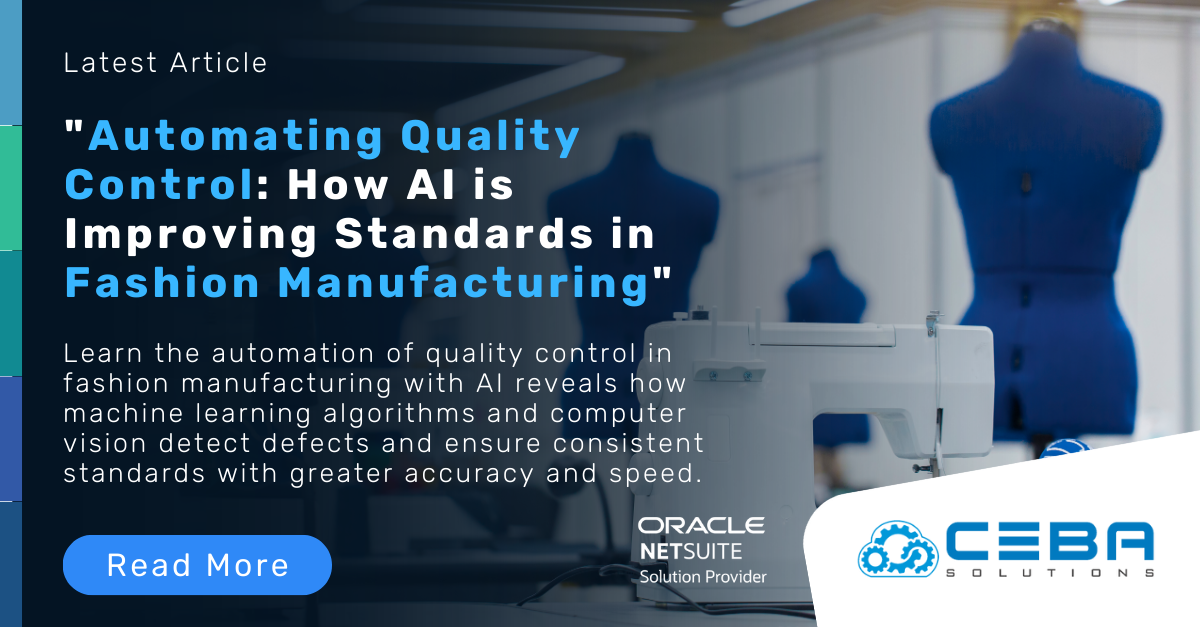
Automating Quality Control: How AI is Improving Standards in Fashion Manufacturing
Automating Quality Control: How AI is Improving Standards in Fashion Manufacturing
In the competitive and detail-oriented world of fashion manufacturing, maintaining high standards of quality is crucial for brand reputation and customer satisfaction. Artificial Intelligence (AI) is revolutionizing the way quality control is conducted in fashion manufacturing by automating inspections and enhancing precision. This article explores the impact of AI on quality control processes, demonstrating how it helps maintain impeccable standards efficiently and consistently.
1. AI-Powered Visual Inspection Systems
AI technologies are being used to implement automated visual inspection systems in fashion manufacturing. These systems use high-resolution cameras and machine learning algorithms to scrutinize garments and fabrics at various stages of the production process. They are trained to detect anomalies, defects, and variations from established quality standards, ensuring that only products meeting all criteria move forward in the production line.
Benefits:
- Increased Accuracy: AI systems can identify defects that are often too subtle for the human eye, reducing the likelihood of faulty products reaching the market.
- Enhanced Efficiency: Automated inspections are significantly faster than manual checks, speeding up the production process without compromising on quality.
Real-World Application:
For instance, a major fashion brand implemented an AI-powered inspection system in their manufacturing units, resulting in a 30% reduction in defective products and a 20% increase in overall production speed. The system's ability to detect minute flaws that human inspectors often missed played a pivotal role in improving product quality.
2. Predictive Maintenance of Manufacturing Equipment
AI not only enhances product inspections but also predicts when manufacturing equipment requires maintenance. By analyzing data from machine operations, AI predicts potential failures before they occur, allowing for timely maintenance to prevent machine breakdowns that could compromise product quality.
Benefits:
- Reduced Downtime: Keeping equipment in optimal condition minimizes unexpected breakdowns that can cause production delays and quality issues.
- Longer Equipment Lifespan: Regular, data-driven maintenance extends the life of manufacturing equipment, ensuring consistent quality control.
Real-World Application:
A textile manufacturer using AI-driven predictive maintenance saw a 40% reduction in unexpected equipment failures. This proactive approach to maintenance helped them maintain a consistent production flow and significantly reduced costs associated with emergency repairs.
3. Integration with Manufacturing Execution Systems (MES)
AI integrates seamlessly with Manufacturing Execution Systems, providing a holistic view of the production process. This integration enables real-time tracking of quality data across different stages and batches of production, allowing for immediate adjustments to maintain quality standards.
Benefits:
- Real-Time Quality Monitoring: Immediate insights into quality metrics help manufacturers quickly address any deviations from quality standards.
- Consistency Across Batches: Ensures that every batch of products meets uniform quality standards, enhancing brand reliability.
Real-World Application:
By integrating AI with MES, a clothing manufacturer was able to monitor and adjust production parameters in real-time, resulting in a 25% improvement in quality consistency across all product lines. This integration helped them swiftly identify and rectify quality issues, ensuring that all products met their rigorous standards.
4. Automated Reporting and Compliance Tracking
AI automates the generation of quality reports and compliance documentation, ensuring that all products meet industry standards and regulations. This not only streamlines the audit process but also helps fashion brands maintain transparency with consumers and regulators.
Benefits:
- Streamlined Compliance: Automated systems ensure that all necessary quality checks and compliance measures are documented, simplifying legal and regulatory processes.
- Enhanced Traceability: Provides detailed records of quality controls for every product, increasing accountability and traceability.
Real-World Application:
A global fashion retailer utilized AI to automate compliance reporting, reducing the time spent on regulatory documentation by 50%. This automation ensured that all products adhered to international standards, enhancing their credibility and customer trust.
5. Data-Driven Quality Improvement
By collecting and analyzing data from every quality inspection, AI helps identify patterns and trends related to defects and quality issues. This information is invaluable for continuous improvement efforts, allowing manufacturers to refine their processes and prevent recurring issues.
Benefits:
- Continuous Improvement: Ongoing data analysis helps manufacturers enhance production processes and product quality over time.
- Reduced Waste and Cost: Identifying and addressing recurring quality issues reduces waste and associated costs, improving overall operational efficiency.
Real-World Application:
A leading apparel manufacturer used AI analytics to track and analyze defect patterns, leading to a 15% reduction in waste and a significant cost saving. The insights gained from data analysis allowed them to implement targeted improvements in their production process, reducing defect rates and boosting overall efficiency.
Conclusion
AI is setting new standards in fashion manufacturing quality control, providing tools that enhance accuracy, efficiency, and consistency. By automating inspections and integrating data-driven processes, AI not only upholds high-quality standards but also drives continual improvement in manufacturing practices. As AI technologies evolve, their role in ensuring product excellence and brand integrity in fashion manufacturing will become increasingly indispensable.
Incorporating AI into quality control processes not only benefits manufacturers by improving efficiency and reducing costs but also ensures that consumers receive high-quality products. The future of fashion manufacturing looks promising with AI paving the way for smarter, more reliable, and sustainable practices.





